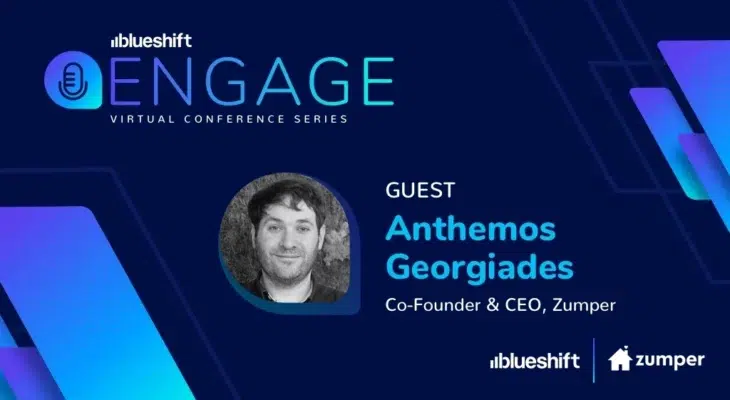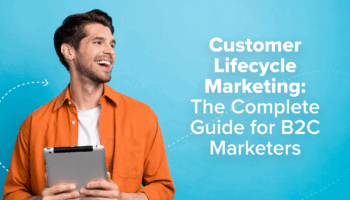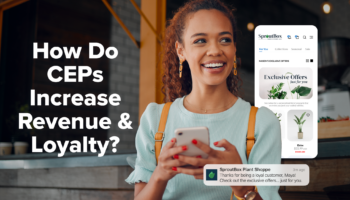Marketers, business leaders, and Blueshift users have come together for our first-ever virtual conference: Blueshift Engage. For one hour each day, we’ve brought the brightest minds in marketing to our attendees — live from their living rooms. We know marketers are busy folks, so we’ve taken our live sessions and picked out the best bits for your reading pleasure. First up, Blueshift CEO, Vijay Chittoor, sat down with the CEO and Co-Founder of Zumper, Anthemos Georgiades to discuss what is on the growth-minded CEO’s mind during these uncertain times and how they approach marketing.
Blueshift Engage: The CEO’s View on Marketing & Growth

ZUMPER’S JOURNEY AND PARTNERSHIP WITH BLUESHIFT
During his university years in the dotcom era, Anthemos noticed how quickly hotel sites seemed to be popping up. Ever the forward thinker, he assumed something for the apartment rental market would soon follow — but it never did. So, in 2011, after years of harrowing apartment searches, Zumper was born with the mission to make finding and renting an apartment as easy as booking a hotel for the night.
The company has since scaled up to over 200 employees and has raised $150 million in venture capital, and has been a key partner to Blueshift for nearly 3 years. If you’re interested in learning more about Zumper’s success with Blueshift, read our full case study here.
Along with sharing a professional connection, both Vijay and Anthemos are alumni of Harvard Business School. But, it should be noted that in Vijay’s words, “This session will cover everything they don’t teach at Harvard.” And with that, let’s dive into how real-world CEOs view growth, and what that means for marketers looking to partner with leadership in both good times and bad.
DISRUPTING A TRADITIONALLY OFFLINE EXPERIENCE
Apartment searching used to take (the awfully tedious) form of searching through listings in papers or procuring the services of a broker. And while there were many issues with this system, it did have the benefit of interacting with a human who knew your preferences and could offer a personalized and less stressful experience.
Vijay: How did the Zumper team go about building a product to replicate the broker experience online?
Anthemos: It’s hard to replace a human being, but AI and machine learning can really come to force. What’s beautiful about AI is that it is purely objective — there are patterns we can recognize when a customer is using Zumper’s website or one of our apps and then use that data with Blueshift to combine it with how we retarget them. Not only do we know what kinds of listings we should surface for each customer, but at what times of the day. And that is where AI and machine learning can actually understand the renter better than a human can because we can understand the nuances in their behavior.
Vijay: Email and push are a big part of what Zumper outputs, what do these channels mean for your brand?
Anthemos: And although some might think of email and push as hacks to bring in folks and the product can then do its thing, it really is Zumper’s brand experience. They’re incredibly important to the brand because these comms replace what in the “real-world” would be conversations with a broker.
Email and push are the product. Just because they’re not hosted on the URL or in an App store. Actually, our email and app notifications, of which we send 50 million a month, are the single biggest entry point in Zumper’s product. They started as growth hacks to get people into the top of our funnel, but they’re now the same thing as our product.
Vijay: What went into building your growth team for Zumper?
Anthemos: Our growth team, design team, and product team all sit together in one corner of our office — this collaborative mindset has literally had an impact on the layout of our office. And although they are different teams, they primarily focus on solving the same problems. Our platform is all about marketplace liquidity, so we brought on lots of quants early and we remain an organically quant driven organization. We had to be heavily focused on numbers before we could bring in more traditional marketers. I wish we had more here and I think that’s the area of investment which will get us to the next level.
Vijay: What effect does your approach to brand and marketing have on your growth strategy?
Anthemos: As a privately held company we can’t behave like the Zillows of the world. We must have positive ROI marketing and we keep very narrow parameters. We often talk about single-session optimization and how we can buy traffic that converts in the first session. In fact, only 9% of our traffic is paid and the rest is organic. When we do focus on the 9% it’s either breakeven or profitable within that first session. Especially during COVID-19, where we’re obviously being careful with our marketing budget and so we’ve raised the bar so at the very least we know our marketing is breakeven.
In terms of brand, our approach is an interesting one because it’s really hard to build one in an infrequent marketplace. We can’t spend $10 million on a commercial like some of our competitors so we’ve tried to win in terms of content marketing. We’ve positioned ourselves as the expert on rental data so whenever you read any rental reports, most of the time it is Zumper’s data. And even though it doesn’t tell our product story, it tries to position us as a thought leader or an objective source of truth in rental data. And it’s not as great as shouting a bag of brands and telling our story, but it is a great hack.
Vijay: What metrics should marketers keep in mind when aligning their goals with those of their CEO?
Anthemos: At first I cared a lot about lagging indicators, like how many people visited Zumper this month because that’s what your board cares about. But, I think good marketing teams and their CEOs should really focus on leading indicators rather than outputs which can be vanity metrics at our stage of growth.
For example, SEO positions, a classic leading indicator, will directly affect our downstream even if it isn’t for another 30 days. Now with my team in our monthly meeting we just talk about the 4 or 5 leading indicators that matter to us the most. For the first few years, it was just throwing stuff against the wall, seeing if it stuck and now having raised one hundred forty million dollars it looks like it was all inevitable. But as you all know, none of this is ever inevitable. Growth is incredibly calculated and risky.
I would also encourage marketers to call their CEOs out during this iteration process because we’re focused on the outputs and we need to be brought back into the fold leading indicators. Don’t focus on the sexy stuff you tell the press, but rather on the unsexy inputs because that’s where the magic is.
Vijay: How COVID-19 affected how you do business and your strategy?
Anthemos: Phase one where we’re sheltering in place has been hard simply because fewer people are moving and looking for apartments. But phase two will be pretty quite good for our business in a weird way because of pent up demand that’s released when the shelter in place is lifted.
But even though we just raised our series D, we hunker down. And so one thing that we immediately did on the paid side is whereas before we would allow for looser lifecycles, we shifted to ROAs, breakeven, or positive on first-session — otherwise we don’t spend money on it. That cut our discretionary marketing budget in half overnight. Now that is an incredibly narrow definition, but these are the times where we want to be ultra-conservative.
FINAL THOUGHTS
These have been extremely difficult times for many companies, but now is the time to be super demanding of your CEO and your team — this isn’t the time for just ‘ok’ performance. And although we’re all under immense pressure, this is how great marketing teams are born. In fact, all of the best companies are built during downturns because they focus on what matters and they hire brilliant people. The silver lining here is that this is an opportunity for your company to be that amazing next-level brand.


